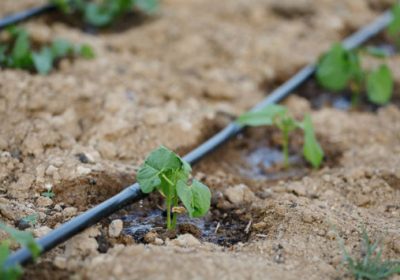Eco-Friendly Gardening: Exploring the Latest Innovations in Sustainable Horticulture

Gardening is a hobby that has been around for centuries. However, with the growing concern about the impact of human activities on the environment, it is becoming increasingly important to consider the sustainability of our gardening practices. Eco-friendly gardening is a way to enjoy the benefits of gardening while reducing our impact on the environment. In this article, we will explore the latest innovations in sustainable horticulture and how they can help us create a more eco-friendly garden.
The Importance of Eco-Friendly Gardening
Gardening is a popular activity that has numerous benefits for both individuals and the environment. It is a way to connect with nature, improve mental health, and provide fresh produce for our families. However, traditional gardening practices can have negative environmental impacts. For example, the use of pesticides and fertilizers as part of pest control efforts, can harm wildlife, pollute water sources, and contribute to soil degradation. The use of non-biodegradable plastic pots and excessive water consumption are other common issues in traditional gardening practices.
Eco-friendly gardening, on the other hand, is a way to enjoy the benefits of gardening while reducing our impact on the environment. Sustainable horticulture practices take into account the ecological, social, and economic aspects of gardening. They focus on reducing waste, conserving water via water tanks, and promoting biodiversity. By adopting eco-friendly gardening practices, we can create a healthier and more sustainable environment for ourselves and future generations.
Sustainable Gardening Practices
There are many sustainable gardening practices that we can adopt to reduce our impact on the environment. Here are some of the latest innovations in sustainable horticulture:
Composting
Composting is a natural process that turns organic waste into nutrient-rich soil. By composting food scraps, yard waste, and other organic materials, we can reduce the amount of waste that ends up in landfills while creating a valuable resource for our gardens. Compost can be used as a natural fertilizer, improving soil structure and promoting healthy plant growth.
Rainwater Harvesting
Rainwater harvesting is a method of collecting and storing rainwater for later use in the garden. By collecting rainwater, we can reduce our water consumption and prevent stormwater runoff, which can contribute to soil erosion and water pollution. Rainwater can be collected in rain barrels or other containers and used for watering plants, washing garden tools, or cleaning outdoor spaces.
Companion Planting
Companion planting is the practice of planting different types of plants together to benefit each other. For example, planting flowers alongside vegetables can attract pollinators and beneficial insects, reducing the need for pesticides. Similarly, planting certain herbs alongside vegetables can repel pests and improve soil health.
Integrated Pest Management
Integrated Pest Management (IPM) is a holistic approach to pest control that focuses on preventing pest problems before they occur. IPM involves using a combination of biological, cultural, and chemical control methods to manage pests while minimizing the use of pesticides. By adopting IPM practices, we can reduce our reliance on harmful chemicals while promoting biodiversity in the garden.
Biodegradable Plant Pots
Traditional plastic plant pots can take hundreds of years to break down in the environment, contributing to plastic pollution. Biodegradable plant pots are made from natural materials such as coconut coir, rice husks, or compressed peat, and can be planted directly into the ground. These pots break down naturally over time, reducing waste and promoting healthy soil.
Innovative Products for Sustainable Gardening
In addition to sustainable gardening practices, there are many innovative products available that can help us create a more eco-friendly garden. Here are some of the latest products in sustainable horticulture:
Vertical Gardens
Vertical gardens are a space-saving and eco-friendly way to grow plants. These gardens are designed to grow plants vertically, using a variety of containers such as pots, hanging baskets, and wall-mounted planters. Vertical gardens can be installed indoors or outdoors and can be used to grow a variety of plants, including vegetables, herbs, and flowers. They are ideal for small spaces and can help reduce urban heat islands by providing natural shade and cooling.
Solar-Powered Garden Lights
Solar-powered garden lights are an eco-friendly way to illuminate outdoor spaces. These lights are powered by solar panels that absorb energy from the sun during the day and use it to light up the garden at night. Solar-powered garden lights are easy to install and require no wiring or electricity, making them a cost-effective and sustainable lighting option.
Smart Irrigation Systems
Smart irrigation systems are an innovative way to conserve water in the garden. These systems use sensors to monitor soil moisture levels and weather conditions, adjusting irrigation schedules accordingly. Smart irrigation systems can reduce water consumption by up to 50%, making them an eco-friendly and cost-effective way to water plants.
Biodegradable Mulch Films
Mulch films are commonly used in agriculture and gardening to suppress weed growth and retain moisture in the soil. However, traditional mulch films are made from non-biodegradable materials such as plastic, which can contribute to plastic pollution. Biodegradable mulch films are made from natural materials such as corn starch, and break down naturally over time, reducing waste and promoting healthy soil.
Bee Hotels
Bee hotels are an eco-friendly way to support pollinators in the garden. These hotels provide nesting spaces for bees and other pollinators, helping to promote biodiversity and ensure healthy plant growth. Bee hotels can be made from a variety of materials such as bamboo, wood, and natural fibers, and can be installed in the garden or on balconies and rooftops.
Benefits of Eco-Friendly Gardening
Adopting eco-friendly gardening practices and using innovative sustainable gardening products has numerous benefits for both individuals and the environment. Here are some of the benefits of eco-friendly gardening:
Improved Soil Health
Eco-friendly gardening practices such as composting and companion planting can improve soil health by increasing organic matter and promoting healthy soil microbes. Healthy soil supports healthy plant growth, leading to higher yields and healthier produce.
Reduced Water Consumption
Sustainable gardening practices such as rainwater harvesting and smart irrigation systems can reduce water consumption by up to 50%, helping to conserve this precious resource.
Increased Biodiversity
Eco-friendly gardening practices such as companion planting and bee hotels can support pollinators and other beneficial insects, promoting biodiversity and ensuring healthy plant growth.
Reduced Waste
Sustainable gardening practices such as composting and using biodegradable plant pots and mulch films can reduce waste and promote healthy soil.
Improved Air Quality
Plants are natural air purifiers, removing pollutants and producing oxygen. Eco-friendly gardening can help to improve air quality in our communities, leading to a healthier environment for ourselves and future generations.
Conclusion
Eco-friendly gardening is a way to enjoy the benefits of gardening while reducing our impact on the environment. By adopting sustainable gardening practices and using innovative products, we can create a healthier and more sustainable environment for ourselves and future generations. The latest innovations in sustainable horticulture, such as vertical gardens, solar-powered garden lights, and smart irrigation systems, are making it easier than ever to create an eco-friendly garden. By making small changes in our gardening practices, we can all contribute to a healthier and more sustainable planet.
In conclusion, eco-friendly gardening is a great way to promote sustainability and contribute to a healthier environment. By adopting sustainable gardening practices and using innovative products, we can reduce our impact on the environment while enjoying the benefits of gardening. The latest innovations in sustainable horticulture, such as vertical gardens, solar-powered garden lights, and smart irrigation systems, are making it easier than ever to create an eco-friendly garden.
By improving soil health, reducing water consumption, increasing biodiversity, reducing waste, and improving air quality, eco-friendly gardening has numerous benefits for both individuals and the environment. These benefits can lead to healthier produce, lower energy costs, and a healthier environment for ourselves and future generations.
If you’re interested in creating an eco-friendly garden, there are many resources available to help you get started. You can find information on sustainable gardening practices, innovative gardening products, and eco-friendly landscaping tips from gardening organizations, government agencies, and online resources. By taking small steps towards eco-friendly gardening, we can all contribute to a healthier and more sustainable planet





